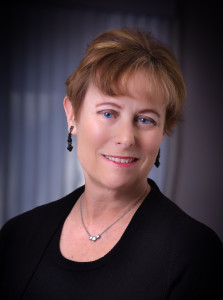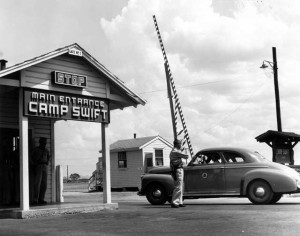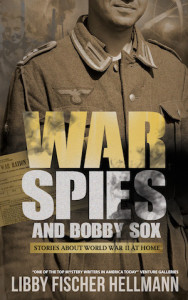 Relevant History welcomes Libby Fischer Hellman, who left a career in broadcast news in Washington, DC and moved to Chicago thirty-five years ago, where she, naturally, began to write gritty crime fiction. Fifteen novels and twenty-five short stories later, she claims they’ll take her out of the Windy City feet first. She has been nominated for many awards in the mystery and crime writing community and has even won a few, including the Anthony, Foreword Magazine’s Book of the Year, the Agatha, the Shamus, the Daphne. She has won the Ippy and the Readers Choice Award multiple times. For more information about her and her books, visit her web site, view her book trailer, and follow her on Facebook, Twitter, and Google+.
Relevant History welcomes Libby Fischer Hellman, who left a career in broadcast news in Washington, DC and moved to Chicago thirty-five years ago, where she, naturally, began to write gritty crime fiction. Fifteen novels and twenty-five short stories later, she claims they’ll take her out of the Windy City feet first. She has been nominated for many awards in the mystery and crime writing community and has even won a few, including the Anthony, Foreword Magazine’s Book of the Year, the Agatha, the Shamus, the Daphne. She has won the Ippy and the Readers Choice Award multiple times. For more information about her and her books, visit her web site, view her book trailer, and follow her on Facebook, Twitter, and Google+.
*****
My trilogy of WW2 stories, War, Spies, and Bobby Sox, is set during the war. It includes two novellas and a short story, all set in Chicago and the surrounding area. Because my knowledge of battles and military strategy is quite limited, all three stories examine the effects of wartime on the people who stayed home while their loved ones went abroad to fight. Here’s a look at the motivations that drove me to write the stories.
The contemporary appeal of WW2
People frequently ask, why World War Two? I’ve always been an avid reader of fiction set in the period, mostly because it’s one of those rare times where the line between good and evil was crystal clear and unambiguous. That doesn’t often happen, especially now.
WW2 was a time where some people turned out heroic and others were cowards, a time rich in potential conflict and ripe for character development. At first I was intimidated at the thought of writing about it, because so much had already been written about it, and so beautifully. What could I bring to the party? But when a friend encouraged me to give it a go, I decided to choose just a small part of the vast canvas. The three stories that fell out make up War, Spies and Bobby Sox.
I wasn’t certain today’s readers were still interested in the period. But I was wrong. It still fascinates people. In today’s landscape of widespread government surveillance, 24-hour news, drone strikes, post-truth, expert-hating, and Trump, a clear-cut hero is rare. Our leaders have been known to lie to us, and we’ve lost faith in our institutions. We’ve entered what I call “The Age of Gray.” So the idea that there was once something worth believing in, something that united us despite our circumstances, has a powerful appeal.
Research, research and more research
Research is my favorite part of the writing process. I could read and take notes all day. I had already taken a long, hard look at espionage techniques and strategy. I’d visited Bletchley Park in the UK and DC’s Spy Museum. And, while I knew nothing about physics or atoms, I knew I wanted to write about the early years of the Manhattan Project (before it was called that) at the University of Chicago. That meant even more studying just so I could claim a rudimentary understanding of the nuclear fission process. The result was The Incidental Spy, the first novella in the collection. By the way, I’d also visited and had lunch in Berlin’s Tiergarten (their version of Central Park). I recall thinking that if I ever wrote anything set in Berlin, I’d have to set a scene in the park. Guess where the first scene of An Incidental Spy is set?
I’d originally planned to write a companion piece about the women who worked at Bletchley, but someone in my exercise class (See, there are reasons to work out) mentioned an ex-prison camp German POWs less than two miles away.
German POWs? Here in Chicago?
 It didn’t take long to discover there were almost half a million German POWs in the US, held in more or less every state between 1943-1945. They worked on farms and in factories. It wasn’t a secret, but the US Army, which managed them, didn’t advertise the fact either. Consequently, a lot of the details and stories about their time here have melted away. But I was hooked, so the companion novella about two German POWs and their “love” triangle with a farm girl was born.
It didn’t take long to discover there were almost half a million German POWs in the US, held in more or less every state between 1943-1945. They worked on farms and in factories. It wasn’t a secret, but the US Army, which managed them, didn’t advertise the fact either. Consequently, a lot of the details and stories about their time here have melted away. But I was hooked, so the companion novella about two German POWs and their “love” triangle with a farm girl was born.
Discovering 1930s Lawndale
The third story is about an actress in the Yiddish theater in Chicago’s Lawndale, a thriving Jewish community in the ‘30s, and how she came to spy on the German-American Bund. This story is set in 1938, before the war officially began, but war fever was high, and at the time Fritz Kuhn, who was eventually deported, was the head of the fascist Nazi-inspired Bund. Incidents of anti-Semitic bullying, fist fights, and worse were on the rise. It was a dangerous time.
My research for that originated with my son, who was preparing for his Bar Mitzvah. Someone had given him an amazing book called “The Jews of Chicago.” Idly flipping through it, I found a 1930s photo of immigrant butchers in Lawndale, standing behind the meat counter in a deli. I’m still not sure why it stopped me. It could have been the lighting, their blood-spattered aprons, the expression in their eyes—a mixture of pride, hope, and fatigue. But I instantly knew I had to write about people like them. So I toured Lawndale, interviewed people who had lived there at the time, and “The Day Miriam Hirsch Disappeared” was the result.
A growing trend
I’m not alone in my fascination with those dark times. All The Light You Cannot See, Sarah’s Key, Nightingale, Jody Picoult’s The Storyteller, Unbroken by Laura Hillebrand, The Women in the Castle, and more, have all come out recently. In fact, there’s a new sub-genre of literature developing around WW2. I’m thrilled to be part of it.
*****
 A big thanks to Libby Hellman. She’ll give away an ebook copy (winner’s choice of format) of War, Spies, and Bobby Sox to two people who contribute a comment on my blog this week. I’ll choose the winners from among those who comment by Friday at 6 p.m. ET.
A big thanks to Libby Hellman. She’ll give away an ebook copy (winner’s choice of format) of War, Spies, and Bobby Sox to two people who contribute a comment on my blog this week. I’ll choose the winners from among those who comment by Friday at 6 p.m. ET.
**********
Did you like what you read? Learn about downloads, discounts, and special offers from Relevant History authors and Suzanne Adair. Subscribe to Suzanne’s free newsletter.

Looks like something I need to read. Love fiction set in Chicago, and this sounds really different. As for German POWs in the US, my friend’s father first came here as a young man and POW. I believe the camp was in the Carolinas. He liked it so much he stayed.
Fascinating. I write in post-WWII and I also often hear from people who long for those days when it seems moral lines were crystal clear. Of course, I write about Hollywood, so moral lines were anything but. However, I can certainly appreciate how comforting readers find our era.
I’ve been fascinated by World War II since I was a kid in the 60s. My father served aboard an aircraft carrier and he, along with my mother, told me stories about their experiences during that time. And, of all places, I was also inspired by the TV show, Hogan’s Heroes, where they did mention the German-American Bund in one of the episodes. Seeing the movie Patton, further spurred my interest in reading about this time, both in fiction and non-fiction.
My brother’s father-in-law was a German soldier, who was held in Scotland as a POW. This is where he met his wife, a Scottish war widow with two sons. My sister in law was the only child born of that marriage, and they immigrated to the US in 1953, aboard the Queen Mary.
My mother was an a baby sitter in Amagansett, Long Island during the war. One day while taking her charges to the beach, she was stopped while the Coast Guard looked in the trunk. German spies had come ashore from a submarine and hopped a train to NYC. Of course, it was a commuter train and everyone knew everyone else, so the spies were spotted and picked up very quickly.
cj Sez: Thanks for sharing your process of creating a beautiful nugget of story out of the epic conflict of WWI, Libby. Yep, it’s all about the research. Love the title. (PS I’m curious: Any relation to Lillian?)
Yikes…I meant to type WWII…..(sigh)
Thanks for all the lovely comments on the blogpost. I did enjoy writing the novellas.
Mary, that was a huge story in its time; there have been novels written about those spies.
cj, no relation to Lillian, unfortunately — or to the mayonnaise people.:)
Tracy: what a happy ending to a tumultuous era! Well done, in-laws!
Larry: are you from Chicago? Just wondering
Sheila: Thanks for your comment. Yes, it does seem that people flock to the recent past, perhaps even more than the “long ago” past…
I have a great interest in WWII history and it’s unknown stories. My father was a young soldier in the Battle of the Bulge but he never talked about his experiences there as a medic. All I have is a copy of a long letter he wrote home before he went to France. I know a little about the German POWs sent to the United States from watching TV movies and PBS programs. My grandfather immigrated from Germany in 1918 and I recently came across his United States Petition for Citizenship where he renounced any allegiance to The German Reich.
Particularly glad I stopped by today! Fascinating to read all the comments here and get to know Libby and her works. Definitely a new author to read, and whose books will no doubt find their way to my bookshelf. Loved that Libby shared those ordinary moments that sparked the kernels of her stories, too. Research is the best part of writing, I think.
Thanks, Alice! You made my day.
I have become fascinated with WWII fiction since seeing the series called “Bletchley Circle” on TV and reading The Guernsey Literary and Potato Peel Pie Society. I also enjoyed Sara Elia Maclean’s Maggie Hope series. I’m happy to know about your collection of stories and look forward to reading them. I agree that one of the appeals is the clear definition of good and bad. Not that anything in war is all one or the other, but it seemed so in WWII.
Because I grew up during the era that Libby writes about, I’ve read her books from the start and found all of them riveting. How gratifying to now learn from your blog of the resurgence of interest in this period, showing how relevance circles around…if we live long enough
I’m old enough to remember WWII. I used some of my memories to use in a YA, with a teen ghost from 1946. The memories started it, but I needed research as well.
Your book sounds fascinating!
WWII or just prior to is my favorite genre to read in and write of. I currently have a manuscript in the works. Takes a lot of research and plotting but I enjoy it. Almost all of the books mentioned in the Growing Trend I have read. I enjoyed getting to know Libby Fischer Hellman.
Wow.. have you ever realized how quickly history can change course? Just look at the past 24 hours… kind of makes me wish I was still in broadcast news. Or not. I’d probably have a heart attack in short order.
Anyway, thanks all for your input and perspective about the war years. WW2 is clearly going through a resurgence and has been for a while. Norma, I bet you have some fascinating stories to tell. CHris, great to touch base with you. It’s been forever… thanks for the kind words.
Caroline, I havent read Sara, but Rhys’s IN FAIRLEIGH FIELD is on my TBR pile. Have you read it?
Claire, thanks for taking a little time to chat with me. I appreciate it.
And Suzanne, thanks most of all for giving me the opportunity to talk history, research, and war.